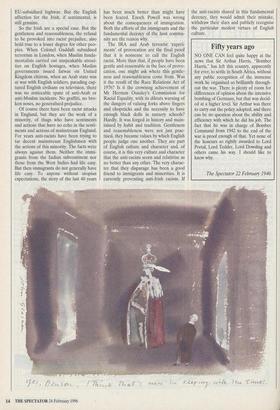THE TRUTH ABOUT THE IRISH
As the IRA bombs explode again,
Digby Anderson says what his fellow
English really think about the Irish
A LEADING teaching union has reported a spate of incidents in which children with Irish surnames have been taunted and even physically assaulted by other children. In Leeds, 11-year-old Patrick O'Halloran was taken to hospital with a suspected bro- ken nose after a crowd of other boys attacked him in the playground. The bul- lies were said by one teacher to have shouted, 'IRA bastard'. In another shock- ing incident in Coventry, a 12-year-old girl was found in tears in a classroom after school by a teacher. Tied round her neck was a paper saying: 'That's for Docklands'.
The last two weeks have also seen anti- Irish graffiti appearing in the larger towns across England. The Irish Tourist Office reports a drop of 30 per cent in English bookings. Even theatres in London show- ing plays by authors with Irish names have been the victims of anti-Irish prejudice with near-empty houses.
Don't worry. It is not true. I have made it up. There has been no wave of anti-Irish racism since the Docklands bombing, no broken noses in playgrounds, no graffiti, no interference with holiday bookings because of prejudice. There have not even been newspaper columnists indignantly demanding the end to social security handouts to persons of Irish citizenship. I cannot be certain that not one incident has happened, but there certainly has been no wave of anti-Irish prejudice at the time of writing. We should surely be grateful for this. But it is equally surely a fact demand- ing explanation. Why not?
Consider: the English people have been viciously provoked by the IRA. These same English people are the ones who, progressive commentators endlessly remind us, have for centuries oppressed the Irish. You would have thought it would now come as a natural reaction after so much practice. But not a whisper. Yet these silent Middle English are the people who the race relations industry confidently assures us are sunk in institutionalised racism. Provoke them and this deep-seated racism would burst forth as from a breached dam. But no outburst. Why no anti-Irish prejudice?
It is as if an experiment had been con- ducted. Provoke these people, goad them, do everything possible to push them to take that little, easy step from condemning the IRA in particular to condemning the Irish in general, and they have totally refused. Not even those hurt in the bombing, the relatives of those killed, those who have lost property or jobs, have to my knowl- edge uttered the mildest anti-Irish, as opposed to anti-terrorist, sentiment. In fact, the experiment shows the English not only as having no racist reaction, but as overwhelmingly gentle and reasonable.
This is partly to do with the amused affection in which many English people hold the Irish. One has to say it may be a romanticised affection. The contemporary Eire is not full of charming old boys drink- ing Guinness, telling stories and wandering home down country lanes. Almost every- one in Ireland is now aged 17, drinks Bud- weiser, behaves as unamusingly as any other 17-year-old and is taken home via an EU-subsidised highway. But the English affection for the Irish, if sentimental, is still genuine.
So the Irish are a special case. But the gentleness and reasonableness, the refusal to be provoked into racist prejudice, also hold true to a lesser degree for other peo- ples. When Colonel Gaddafi subsidised terrorism in London, when Muslim funda- mentalists carried out unspeakable atroci- ties on English hostages, when Muslim governments issued fatwas on United Kingdom citizens, when an Arab state was at war with English soldiers, parading cap- tured English civilians on television, there was no noticeable spate of anti-Arab or anti-Muslim incidents. No graffiti, no bro- ken noses, no generalised prejudice.
Of course there have been racist attacks in England, but they are the work of a minority, of thugs who have sentiments and actions that have no echo in the senti- ments and actions of mainstream England. For years anti-racists have been trying to tar decent mainstream Englishmen with the actions of this minority. The facts were always against them. Neither the immi- grants from the Indian subcontinent nor those from the West Indies had life easy. But then immigrants do not generally have life easy. To anyone without utopian expectations, the story of the last 40 years has been much better than might have been feared. Enoch Powell was wrong about the consequences of immigration. Both the efforts of the immigrants and the fundamental decency of the host commu- nity are the reason why.
The IRA and Arab terrorist 'experi- ments' of provocation are the final proof that it is nonsense to call the English racist. More than that, if people have been gentle and reasonable in the face of provo- cation, one might ask where this gentle- ness and reasonableness come from. Was it the result of the Race Relations Act of 1976? Is it the crowning achievement of Mr Herman Ouseley's Commission for Racial Equality, with its diktats warning of the dangers of valuing forks above fingers and chopsticks and the necessity to have enough black dolls in nursery schools? Hardly. It was forged in history and main- tained by habit and tradition. Gentleness and reasonableness were not just prac- tised, they became values by which English people judge one another. They are part of English culture and character and, of course, it is this very culture and character that the anti-racists scorn and relativise as no better than any other. The very charac- ter that they disparage has been a good friend to immigrants and minorities. It is currently preventing anti-Irish racism. If the anti-racists shared in this fundamental decency, they would admit their mistake, withdraw their slurs and publicly recognise the particular modest virtues of English culture.



























































 Previous page
Previous page